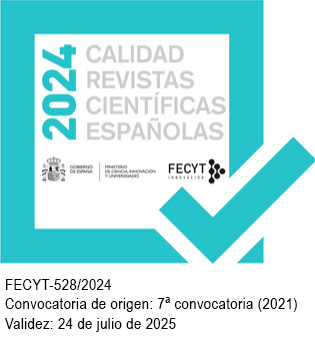Answers to Multiple Questions in Greek Drama
doi: https://doi.org/10.31810/rsel.52.2.7
Keywords:
Multiple true questions; order of answers; preference for contiguity; Ancient Greek; Conversation AnalysisAbstract
The focus of this paper is to analyse the order in which heaped questions are answered in a selection of plays by Aeschylus, Sophocles, Euripides, Aristophanes, and Menander. According to Sacks (1987), the last question is expected to be answered first by virtue of the so-called «preference for contiguity». This is the usual order in Homer, as Cicero already noticed (Att. 1. 16. 1). In Greek Drama, however, we can hardly affirm that there is any preference for contiguity, at least as far as multiple questions and multiple answers are concerned.
Downloads
References
Andò, V. (2021). Euripide. Ifigenia in Aulide. Introduzione, testo critico, traduzione e commento. Venecia: Edizioni Ca’ Foscari.
doi: https://doi.org/10.30687/978-88-6969-513-1
Bassett, S. E. (1920). ῞ΥΣΤΕΡΟΝ ΠΡΟΤΕΡΟΝ ὉΜΗΡΙΚΩΣ (Cicero, Att. 1, 16, 1). Harvard Studies in Classical Philology, 31, 39-62.
CGCG = Emde Boas, E. van, Rijksbaron, A., Huitink, L. y de Bakker, M. (2019). The Cambridge Grammar of Classical Greek. Cambridge: Cambridge University Press. doi: https://doi.org/10.1017/9781139027052
Condello, F. (2016). Sofocle. Edipo Re. Milán: Rusconi Libri.
Dawe, R. D. (1996). Sophoclis Oedipus Rex (3ª ed.). Leipzig: Teubner.
Dawe, R. D. (2006). Sophocles. Oedipus Rex (2ª ed.). Cambridge: Cambridge University Press.
Denniston, J. D. (1954). The Greek Particles (2ª ed.). Oxford: Oxford University Press.
Díaz Tejera, A. (1973). La frase interrogativa como modalidad. Revista Española de Lingüística, 3(1), 95-116.
Recuperado de: http://revista.sel.edu.es/index.php/revista/article/view/284
Diggle, J. (1984-1994). Euripidis fabulae (3 vols.). Oxford: Oxford University Press. doi: https://doi.org/10.1093/actrade/9780198145943.book.1 (vol. 1);
doi: https://doi.org/10.1093/actrade/9780198145905.book.1 (vol. 2);
doi: https://doi.org/10.1093/actrade/9780198145950.book.1 (vol. 3)
Diggle, J. (1990). The Teubner Phoenissae. The Classical Review, 40(1), 6-11.
doi: https://doi.org/10.1017/S0009840X0025186X
Enfield, N. J., Stivers, T., Brown, P., Englert, C., Harjunpää, K., Hayashi, M., Heinemann, T., Hoymann, G., Keisanen, T., Rauniomaa, M., Raymond, C. W., Rossano, F., Yoon, K.-E., Zwitserlood, I. y Levinson, S. C. (2019). Polar answers. Journal of Linguistics, 55(2), 277-304.
doi: https://doi.org/10.1017/S0022226718000336
Finglass, P. J. (2018). Sophocles. Oedipus the King. Cambridge: Cambridge University Press.
doi: https://doi.org/10.1017/9781108303439
Hayano, K. (2013). Question Design in Conversation. En J. Sidnell y T. Stivers (Eds.). The Handbook of Conversation Analysis (pp. 395-414). Chichester: Wiley-Blackwell. doi: https://doi.org/10.1002/9781118325001.ch19
Heritage, J. y Raymond, G. (2012). Navigating Epistemic Landscapes: Acquiescence, Agency and Resistance in Responses to Polar Questions. En J. P. De Ruiter (Ed.). Questions: Formal, Functional and Interactional Perspectives (pp. 179-192). Cambridge: Cambridge University Press.
doi: https://doi.org/10.1017/CBO9781139045414.013
Jong, I. J. F. de (1991). Narrative in Drama. The Art of the Euripidean Messenger-Speech. Leiden: Brill.
doi: https://doi.org/10.1163/9789004329126
Kamerbeek, J. C. (1967). The Plays of Sophocles. Commentaries. Part IV: The Oedipus Tyrannus. Leiden: Brill.
Kovacs, D. (2002). Euripides. Helen. Phoenician Women. Orestes. Cambridge: Harvard University Press.
Lee, S.-H. (2013). Response Design in Conversation. En J. Sidnell y T. Stivers (Eds.). The Handbook of Conversation Analysis (pp. 415-432). Chichester: Wiley-Blackwell. doi: https://doi.org/10.1002/9781118325001.ch20
Liddicoat, A. J. (2022). An Introduction to Conversation Analysis (3ª ed.). Londres: Bloomsbury.
Lloyd-Jones, H. y Wilson, N. G. (1990). Sophoclis fabulae. Oxford: Oxford University Press.
doi: https://doi.org/10.1093/actrade/9780198145776.book.1
March, J. (2020). Sophocles. Oedipus Tyrannus. Liverpool: Liverpool University Press.
Mastronarde, D. J. (1979). Contact and Discontinuity: Some Conventions of Speech and Action on the Greek Tragic Stage. Berkeley: University of California Press.
Mastronarde, D. J. (1988). Euripides. Phoenissae. Leipzig: Teubner.
Minchin, E. (2001). How Homeric is «Hysteron Proteron?». Mnemosyne, 54(6), 635-645. doi: https://doi.org/10.1163/15685250152952112
Minchin, E. (2007). Homeric Voices. Discourse, Memory, Gender. Oxford: Oxford University Press.
doi: https://doi.org/10.1093/acprof:oso/9780199280124.001.0001
Mittwoch, A. (1979). Final Parentheticals with English Questions: Their Illocutionary Function and Grammar. Journal of Pragmatics, 3(5), 401-412.
doi: https://doi.org/10.1016/0378-2166(79)90016-X
Murray, G. (1902). Euripidis fabulae (vol. 3). Oxford: Oxford University Press.
Page, D. L. (1972). Aeschyli septem quae supersunt tragoedias. Oxford: Oxford University Press.
doi: https://doi.org/10.1093/actrade/9780198145707.book.1
Pearson, A. C. (1929). Sophoclea III. The Classical Quarterly, 23(3/4), 164-176.
Perusino, F. (Ed.). y Beta, S. (Trad.). (2020). Aristofane. Lisistrata. Milán: Fondazione Lorenzo Valla/Mondadori.
Pomerantz, A. y Heritage, J. (2013). Preference. En J. Sidnell y T. Stivers (Eds.). The Handbook of Conversation Analysis (pp. 210-228). Chichester: Wiley-Blackwell. doi: https://doi.org/10.1002/9781118325001.ch11
Raymond, G. (2003). Grammar and Social Organization: Yes/No Interrogatives and the Structure of Responding. American Sociological Review, 68(6), 939-967.
doi: https://doi.org/10.2307/1519752
Risselada R. (1993). Imperatives and Other Directive Expressions in Latin: A Study in the Pragmatics of a Dead Language. Ámsterdam: J.C. Gieben.
doi: https://doi.org/10.1163/9789004408975
Risselada, R. y Shalev, D. (en prensa). Sequencing, Adjacency and Preference. En R. Verano (Ed.). Conversation Analysis and Classics. Talk in Ιnteraction in Greek and Latin Literature.
Rodríguez-Piedrabuena, S. (2021). Preguntas indirectas ecoicas en griego clásico. Euphrosyne, 49, 77-99.
doi: https://doi.org/10.1484/J.EUPHR.5.128796
Rodríguez-Piedrabuena, S. (en prensa). Repetitional Responses in Classical Greek. En R. Verano (Ed.). Conversation Analysis and Classics. Talk in Interaction in Greek and Latin Literature.
Rodríguez-Piedrabuena, S. y Verano, R. (en prensa). Actions and Turns. En R. Verano (Ed.). Conversation Analysis and Classics. Talk in Interaction in Greek and Latin Literature.
Ruiz Yamuza, E. (2011). Aproximación a las estrategias de mitigación en Plutarco: el uso de adverbios de modalidad. En J. M. Candau Morón, F. J. González Ponce y A. L. Chávez Reino (Eds.). Plutarco transmisor. Actas del X Simposio Internacional de la Sociedad Española de Plutarquistas (pp. 505-519). Sevilla: Secretariado de Publicaciones de la Universidad de Sevilla.
Sacks, H. ([1987] 2010). On the Preferences for Agreement and Contiguity in Sequences in Conversation. En P. Griffiths, A. J. Merrison y A. Bloomer (Eds.). Language in Use. A Reader (pp. 8-22). Abingdon: Routledge.
Sadock, J. M. (1970). Whimperatives. En J. M. Sadock y A. L. Vanek (Eds.). Studies Presented to Robert B. Lees by his Students. Linguistic Research (pp. 223-239). Edmonton: Linguistic Research.
Sadock, J. M. (1971). Queclaratives. En C. Corum et al. (Eds.). Papers from the Seventh Regional Meeting of the Chicago Linguistics Society (pp. 223-232). Chicago: Chicago Linguistic Society.
Sandbach, F. H. (1972). Menandri reliquiae selectae. Oxford: Oxford University Press. doi: https://doi.org/10.1093/actrade/9780198147374.book.1
Schegloff, E. A. (2007). Sequence Organization in Interaction: A Primer in Conversation Analysis (vol. 1). Cambridge: Cambridge University Press.
doi: https://doi.org/10.1017/CBO9780511791208
Schegloff, E. A. y Sacks, H. (1973). Opening up Closings. Semiotica, 8(4), 289-327.
doi: https://doi.org/10.1515/semi.1973.8.4.289
Schenkeveld, D. M. (1984). Studies in the History of Ancient Linguistics: II. Stoic and Peripatetic Kinds of Speech Act and the Distinction of Grammatical Moods. Mnemosyne, 37(3/4), 291-353.
doi: https://doi.org/10.1163/156852590X00054
Schmidt-Radefeldt, J. (1977). On So-Called ‘Rhetorical’ Questions. Journal of Pragmatics, 1(4), 375-392.
doi: https://doi.org/10.1016/0378-2166(77)90029-7
Searle, J. R. (1969). Speech Acts: An Essay in the Philosophy of Language. Cambridge: Cambridge University Press.
doi: https://doi.org/10.1017/CBO9781139173438
Sidnell, J. (2010). Conversation Analysis: An Introduction. Chichester: John Wiley & Sons.
Siemund, P. (2018). Speech Acts and Clause Types: English in a Cross-Linguistic Context. Oxford: Oxford University Press.
Stivers, T. (2013). Sequence Organization. En J. Sidnell y T. Stivers (Eds.). The Handbook of Conversation Analysis (pp. 191-209). Chichester: Wiley-Blackwell.
doi: https://doi.org/10.1002/9781118325001.ch10
Stivers, T. y Hayashi, M. (2010). Transformative Answers: One Way to Resist a Question’s Constraints. Language in Society, 39, 1-25.
doi: https://doi.org/10.1017/S0047404509990637
Suñer, M. (1999). La subordinación sustantiva: La interrogación indirecta. En. I. Bosque y V. Demonte (Eds.). Gramática descriptiva de la lengua española (vol. 2, pp. 2149-2195). Madrid: Espasa Calpe.
Veloudis, I. (2018). Exploiting Polar Questions for Expressive Purposes: ‘Queclaratives’ and ‘Whimperatives’ in Modern Greek. Lingua, 204, 117-133.
doi: https://doi.org/10.1016/j.lingua.2017.12.008
Verano, R. (2022). Politeness and Interaction in Ancient Greek: Preventing and Avoiding Dispreferred Reactions in the Dialogues of Plato. Veleia, 39, 209-223.
doi: https://doi.org/10.1387/veleia.22513
West, M. L. (1987). Euripides. Orestes. Warminster: Aris & Phillips.
Wilson, N. G. (2007). Aristophanis fabulae (2 vols.). Oxford: Oxford University Press.
doi: https://doi.org/10.1093/actrade/9780198721802.book.1 (vol. 1);
doi: https://doi.org/10.1093/actrade/9780198721819.book.1 (vol. 2)
Published
How to Cite
Issue
Section
Copyright (c) 2022 Revista Española de Lingüística

This work is licensed under a Creative Commons Attribution-NonCommercial-NoDerivatives 4.0 International License.











